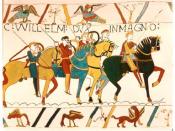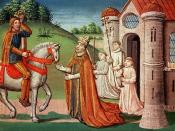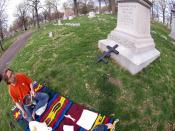Due to the victorious conquest of the barbarians into Europe, the Romans were eventually defeated, therefore altering the weaponry that would dominate the battlefield of the Early Middle Ages (DeVries 9). As it was the Carolingian Empire that dominated this period, it is only right that there most "predominant weapon" get the first mention--the spear. The spear, although introduced in prehistoric periods and used extensively by the Roman Legionnaire, was slightly altered to adhere to the overhaul experienced by the Frankish army under Charlemagne. In 792 he issued his Capitulare missorum requiring a lance (the cavalry version of a spear) be included in the armament for all horsemen, and strengthened its use when in 802 declared the infantry would also be armed with a spear.
The spear underwent many transformations, as it was comprised of a multitude of unmanaged makes and models; however, Charlemagne further enhanced the spear's influence as the major Frankish weapon by both cavalrymen and infantrymen when the practical use of the spear as a javelin was altered and was used a thrusting weapon.
This was vital to the infantry who used this tactic to thrust upwards in order to unhorse an attacking knight and was instrumental in the development of the heavy cavalry that dominated the battlefield in the Middle Early Ages, as the use of a thrusting lance was maximized by way of stirrup, high pommel saddle, and nailed horseshoe to create the "mounted shock combat" (as dubbed by modern historians).
From the longest weapon to the shortest, the dagger, although not relatively used as often as other weapons on the battlefield also played a vital role--especially for the infantryman. The foot soldier relied upon the dagger "almost exclusively" to finish off enemy horsemen who had fallen from their mount, or as a supplemental...



Thought
I like essays like this they are cool.
6 out of 6 people found this comment useful.